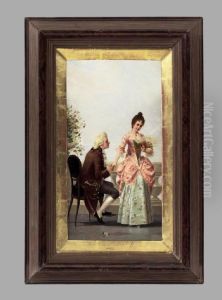Benno Sachs Paintings
Benno Sachs was a German-Jewish musicologist, conductor, and violist who made significant contributions to the field of music history and theory. Born on January 17, 1877, in Breslau, Germany (now Wrocław, Poland), Sachs grew up during a vibrant period in German music history, which was marked by figures such as Johannes Brahms and Richard Wagner.
Sachs initially pursued a career in music performance, focusing on the viola. His interests, however, extended beyond performance into the realms of music theory and history. He studied musicology at the University of Berlin, where he was influenced by prominent scholars such as Hermann Kretzschmar and Max Friedlaender. His academic work led him to explore the intricacies of Renaissance and Baroque music, which he deeply admired for their polyphonic complexity and expressive potential.
In addition to his scholarly pursuits, Sachs was also active as a conductor. He became involved with the Jugendmusikbewegung (Youth Music Movement), which aimed to revive early music and promote musical education. Sachs's work in this movement reflected his commitment to both musicology and practical musicianship. He was a proponent of historically informed performance practices, striving to recreate the sounds and styles of music as they might have been heard in their original contexts.
Unfortunately, Sachs's career and life were dramatically affected by the rise of the Nazi regime in Germany. Because of his Jewish heritage, he faced increasing persecution and was forced to leave his position. In 1937, he emigrated to the United Kingdom, where he continued his academic work despite the challenges of displacement. During his time in the UK, Sachs continued to write and lecture on music, contributing to the understanding of early music performance practices.
Benno Sachs's life came to a tragic end on July 5, 1943, in London, where he died in exile. His legacy, though somewhat overshadowed by the catastrophic events of the time, remains important to the fields of musicology and early music performance. Sachs's scholarship and advocacy for historical accuracy in music performance have influenced generations of musicians and scholars following in his footsteps.


